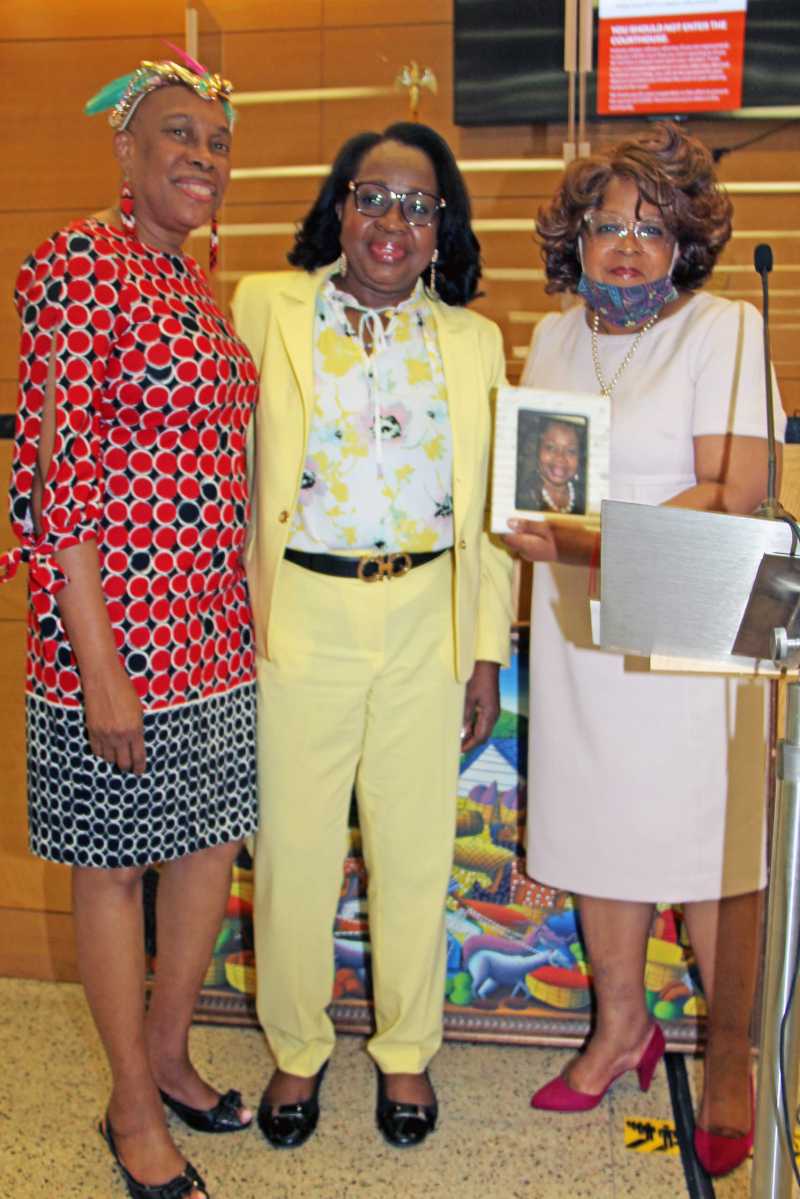In its first in-person celebration since the COVID-19 pandemic, the Kings County Courts Caribbean-American Heritage Month Committee on Thursday honored three outstanding Caribbean-born and Caribbean American legal luminaries during a spectacular lunch-hour ceremony in a large Jury Room at Kings County Supreme Court, downtown Brooklyn.
The honorees were: New York City Corporation Counsel and retired 2nd Department Appellate Division Justice, Barbadian-born Sylvia Hinds-Radix; 2nd Department Appellate Term Justice Michelle Weston, whose parents migrated from Trinidad and Tobago; and Haitian-born Kings County Deputy County Clerk James Blain.
Brooklyn resident Justice Sylvia Hinds-Radix was appointed as the 81st Corporation Counsel of the City of New York on Feb. 25, 2022. In this role, she is the attorney for the City of New York, the Mayor, the City Council and all city agencies – both Mayoral and non-Mayoral.
Prior to her appointment as Corporation Counsel, Justice Hinds-Radix served as an associate justice of the NYS Appellate Division, Second Department from 2012.
In December of 2020, then Gov. Andrew Cuomo designated Justice Hinds-Radix as a member of the NYS Constitutional Bench.
Before joining the Appellate Division, she served as Administrative Judge for Civil Matters in the Second Judicial District for three and a half years. In her capacity as Administrative Judge, Justice Hinds-Radix oversaw both the New York State Supreme Court, Civil Term and the New York City Civil Court, which also encompasses the Housing Court of the City of New York.
Justice Hinds-Radix was elected to the Supreme Court, Kings County in November of 2004 and served as a New York City Civil Court Judge, from 2002 through 2004, spending her first year in the Criminal Court of Kings County.
In 1985, soon after graduating from Howard University School of Law, Justice Hinds-Radix joined the legal staff of District Council 37 Municipal Employees Legal Services, where she remained until her Civil Court election in 2001.
While at DC 37, she practiced in the areas of civil practice, bankruptcy, landlord/tenant and was the general counsel of the immigration program, a program which she founded.
Justice Hinds-Radix earned her Bachelors of Science degree from the University of Massachusetts, her Master’s degree in political science from Long Island University and received her Jurist Doctorate degree (law degree) from Howard University School of Law.
Justice Hinds-Radix also received an honorary doctorate from Metropolitan College of New York (MCNY).
In addition to being admitted to practice law in the State of New York, Justice Hinds-Radix is also admitted to the United States Federal Court: Southern and Eastern Districts of New York.
Justice Hinds-Radix is married to Dr. Joseph Radix, a Grenadian-born dentist, and they are the proud parents of three wonderful daughters, one of whom, Jovia, is a lawyer.
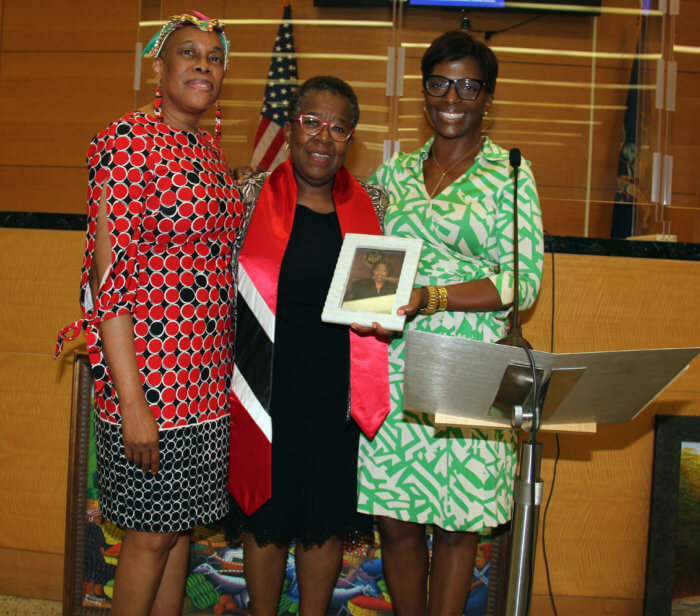
For the past 29 years, Justice Michelle Weston has served as an Associate Justice of the Appellate Term for the Second, Eleventh and Thirteenth Districts, to which she was appointed in April 1993 as the court’s first Black female justice.
In addition to hearing appeals at the Appellate Term, Justice Weston presides over medical malpractice trials in New York State Supreme Court.
Justice Weston’s judicial career began in June 1989, when she was appointed to Criminal Court by then Major Ed Koch. In 1990, she became the first African-American woman elected to Supreme Court in the Second Judicial District.
Justice Weston served in Criminal Term until February 1995, when she was assigned to the Civil Term of Supreme Court.
Since then, she has presided over a broad spectrum of cases, including matrimonial, guardianship and medical malpractice actions.
In addition to her judicial duties, Justice Weston has served in several leadership positions in the New York State Bar Association: Chair of the Judicial Section, chair of the Committee on Procedures for Judicial Discipline, and a member of the House of Delegates. She is also an adjunct professor at Brooklyn Law School.
Justice Weston’s parents and four siblings migrated from Trinidad and Tobago and settled in Brooklyn.
A life-long Brooklyn resident, Justice Weston is the proud mother of Nicholas and Kelle Patterson, and grandmother of Amina Patterson.
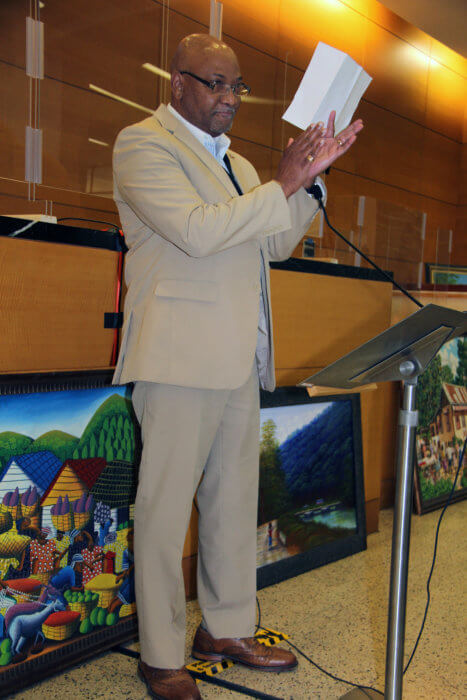
Blain, who was born in Port-au-Prince, the Haitian capital, in 1963, migrated to Brooklyn with his family in 1971. He attended Holy Spirit/Saint Theresa Catholic School, which, most recently, became the New York State Court Officers’ Academy.
Blain attended Chelsea Vocational High School, then earned a Bachelor of Arts in economic and finance from Brooklyn College.
He started working in the NYS Unified Court System as a temporary assistant court analyst for the DCAJ’s Office in White Plains, New York.
In 1990, he was hired as a permanent junior court analyst for the Office of Court Administration in the Budget Office at 80 Centre Street.
Blain worked his way up through the court system by becoming an assistant court analyst for New York City Civil Court in the Administration Department, processing vouchers and assisting with the New York City Civil Court budget.
In 1998, he accepted a position as the administrator in the Kings County Clerk’s Office and has been worked there ever since, becoming the first Haitian-born deputy county clerk in 2017.
Blain is married to Karen Wharton for over 26 years, and they are the proud parents of Kali Blain, a recent graduate from Swarthmore College.
Justice Hinds-Radix, the president and co-founder of the Brooklyn-based Caribbean American Bar Association, said she was very grateful to the Kings County Courts Caribbean Heritage Month Committee for bestowing the special honor on her.
“I remember, a few short years ago, when a couple of my colleagues said to me, ‘we need to start a celebration to honor our Caribbean heritage,’” she told the ceremony, which also included Administrative Judges Matthew D’Emic and Knipel. “How could I say no? That first year, we had over 200 people attend. We brought steel pan and amazing Caribbean food to the court house. And, every year since, the program has gotten bigger and better.
“This program is near and dear to my heart, and I am thankful to my colleagues, both judicial and non-judicial, who have taken over this committee,” Justice Hinds-Radix added. “I know you will continue the tradition of bringing our vibrant Caribbean culture and food to the court. Thank you, again, for this honor, and I look forward to the rest of the program.”
Justice Weston said she was also very grateful for the honor, stating that the award is greater when it comes from one’s peers.
“Congratulation to my fellow honorees, we’ve shared many of the same struggles and successes,” she said, reflecting on the ceremony’s theme, “Our Shared History, Our Shared Future.” “I cannot help but think of my own history and that of my parents, who, like so many other immigrants who came before them, left behind everything they knew in pursuit of the ‘American Dream.’
“Education is a powerful tool,” Justice Weston added. “It is what enlightens us, what makes our voices heard and what defines us in society. It allows us to learn from our past, so that we can improve our future. More importantly, for those of us in the Caribbean community, it enables us to rise above the plight of our ancestors and to achieve our greatest potential, so that each generation that succeeds us will truly savor the fruits of the ‘America Dream.’”
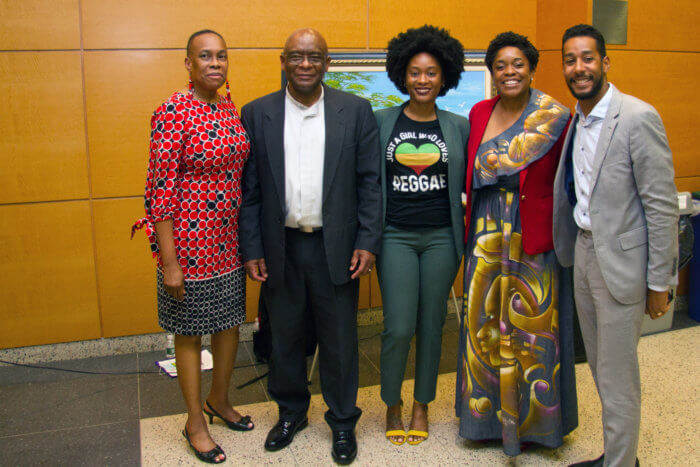
The program also included panelists the first Latino Brooklyn Borough President Antonio Reynoso, the son of Dominican Republic immigrants, and Dr. Nelson A. King, a college professor and long-time senior writer for Caribbean life, who hails from St. Vincent and the Grenadines.
With the focus on “Our Shared History, Our Shared Future”, the educational session looked backward to reveal the thousands of Caribbean immigrants who helped to build America, and looked forward to those now in new spaces, ready and willing to make America the best nation it can be for citizens and immigrants alike.
Entertainment was provided by Grenadian-born gospel singer Ijeal Joseph; Trinidadian pannist Jahlani Roberts; and marimba players Ashley Carter and Genesis Long from the Drums and Bugles International Bands, Inc.
Marimba is one of many African names for the xylophone.
The program closed with delicious “to-go” food packages containing mouth-watering Caribbean cuisine, including jerk chicken, macaroni pie, mango chow and roti.
Trinidadian-born Supreme Court/Appellate Term Justice Wavny Toussaint coordinated the Heritage Committee team, which included judges, court attorneys, court officers, court clerks and other court employees from Barbados, Grenada, Guyana, Haiti, Jamaica, Trinidad and Tobago, Panama and the many other countries that make up the glorious diversity of the Caribbean.
“The 2022 Kings County Courts Caribbean-American Heritage Month Celebration was an engaging, educational, entertaining and culinary lunch-hour success,” Justice Toussaint, a Brooklyn resident, told Caribbean Life afterwards.
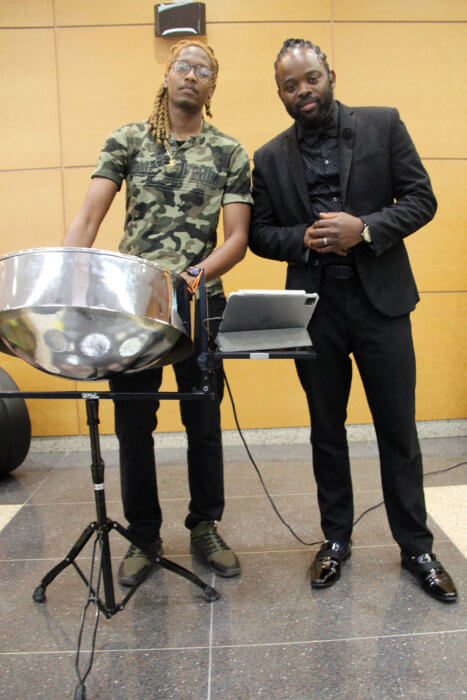
“Immigrants, first generation Americans and Caribbean ‘adjacents’ — Americans with Caribbean spouses, significant others etc., who all work in the Brooklyn Supreme, Surrogate, Civil, Criminal and Housing Courts, shared what country they, their parents or grandparents were from, and how they were contributing to the smooth functioning of our Kings County courts,” she added.
Jamaican-born Natoya L. McGhie, principal court attorney to Justice Jane C. Tully, Kings County Supreme Court – Criminal Term, said she was “humbled” to co-moderate the panel discussion with Haitian Judge Dweynie E. Paul, of New York City Civil Court.
“The Kings County Courts Caribbean-American Heritage Month Committee did such a fantastic job putting on this event,” she told Caribbean Life. “It would not have been possible without the leadership of the Committee Chair, the Hon. Wavny Toussaint, donations from sponsors, as well as the contributions from the committee members.
“Everyone worked hard to ensure a successful program,” McGhie added. “There was entertainment, Caribbean food and displayed artwork by Caribbean artists. More importantly, it was an opportunity to see each other in-person for the first time in two years and to celebrate the rich and diverse culture of Caribbean-Americans.”


